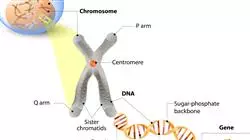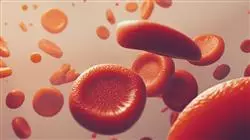University certificate
The world's largest faculty of medicine”
Introduction to the Program
An exceptional program, created to provide medical professionals with the necessary specialization in clinical genetics, with the most comprehensive and up-to-date knowledge in the field”

In current medical practice, genetics is a basic pillar for the diagnosis, treatment and prevention of a large number of diseases, most of which are poorly understood. Its role extends to all medical specialties. It is, therefore, essential for the specialists to know and update their knowledge in clinical genetics, since this is an area in constant growth and with developments that affect multiple medical specialties.
This is why this TECH program has been created, bringing together the experience and expertise of a teaching team with extensive experience in leading clinical genetics practice. Thus, the most current developments in genetic diagnostic techniques, hereditary cancer, genetics of endocrine diseases, variable primary immunodeficiency and many other issues of great interest to the specialist are addressed throughout the entire syllabus. All with an eminently practical focus, providing numerous examples and real clinical cases that help to contextualize the contents.
The program addresses in its different modules the advanced and up-to-date knowledge for the management of patients and their diseases in the clinical genetics practice. It offers a practical approach to the different techniques most commonly used for the diagnosis of hereditary diseases, as well as the interpretation of their results. Likewise, the diseases that cause the greatest number of consultations in daily practice are also discussed in depth, with an up-to-date approach adapted to the highest clinical level.
Its online format makes it possible to combine it with the most demanding professional and personal activity, as it has eliminated the need for on-site classes and fixed schedules. All the content is available from day one, and can be downloaded from any device with an internet connection. This provides a unique flexibility and comfort to combine it with the most demanding professional and personal activity.
A specialty of notable interest to the medical professional, and one which can be efficiently acquired through this pedagogically superior Professional master’s degree"
This Professional master’s degree in Clinical Genetics offers you the advantages of a high-level scientific, teaching, and technological academic program. These are some of its most notable features:
- The latest technology in online teaching software
- A highly visual teaching system, supported by graphic and schematic contents that are easy to assimilate and understand
- Practical cases presented by practising experts
- State-of-the-art interactive video systems
- Teaching supported by telepractice
- Continuous updating and recycling systems
- Autonomous learning: full compatibility with other occupations
- Practical exercises for self-evaluation and learning verification
- Support groups and educational synergies: questions to the expert, debate and knowledge forums
- Communication with the teacher and individual reflection work
- Availability of content from any fixed or portable device with internet connection
- Supplementary documentation databases are permanently available, even after the academic program
Training that will show you the practical methodology for the gathering of necessary information for the construction of the genogram, exposing the symbology and graphic representation of such information"
This program has been developed by professionals from different Clinical Genetics clinics in which they contribute the experience they have gained through daily practice in the care of patients and families with a variety of hereditary disorders, both in genetic counseling and in prevention programs and prenatal and preconception counseling. The faculty involved in the Professional master’s degree also carries out important research work in the field of Genetics.
The Professional master’s degree addresses in its different modules the basic and necessary knowledge for the management of patients and their diseases in a clinical genetics practice. It offers a practical approach to the different techniques most commonly used for the diagnosis of hereditary diseases, as well as the interpretation of the results of the same and, additionally, an approach to the diseases that motivate the largest number of consultations in daily practice in the field of a Clinical Genetics service.
Each module addresses a theoretical text on the subject along with practical examples extracted from clinical cases that will help deepening the student’s understanding and broaden their knowledge.
Do not hesitate, take this training with us. You will find the best teaching along material with top quality virtual lessons"

This 100% online Professional master’s degree will allow you to combine your studies with your professional work while increasing your knowledge in this field"
Why study at TECH?
TECH is the world’s largest online university. With an impressive catalog of more than 14,000 university programs available in 11 languages, it is positioned as a leader in employability, with a 99% job placement rate. In addition, it relies on an enormous faculty of more than 6,000 professors of the highest international renown.

Study at the world's largest online university and guarantee your professional success. The future starts at TECH”
The world’s best online university according to FORBES
The prestigious Forbes magazine, specialized in business and finance, has highlighted TECH as “the world's best online university” This is what they have recently stated in an article in their digital edition in which they echo the success story of this institution, “thanks to the academic offer it provides, the selection of its teaching staff, and an innovative learning method aimed at educating the professionals of the future”
A revolutionary study method, a cutting-edge faculty and a practical focus: the key to TECH's success.
The most complete study plans on the university scene
TECH offers the most complete study plans on the university scene, with syllabuses that cover fundamental concepts and, at the same time, the main scientific advances in their specific scientific areas. In addition, these programs are continuously being updated to guarantee students the academic vanguard and the most in-demand professional skills. In this way, the university's qualifications provide its graduates with a significant advantage to propel their careers to success.
TECH offers the most comprehensive and intensive study plans on the current university scene.
A world-class teaching staff
TECH's teaching staff is made up of more than 6,000 professors with the highest international recognition. Professors, researchers and top executives of multinational companies, including Isaiah Covington, performance coach of the Boston Celtics; Magda Romanska, principal investigator at Harvard MetaLAB; Ignacio Wistumba, chairman of the department of translational molecular pathology at MD Anderson Cancer Center; and D.W. Pine, creative director of TIME magazine, among others.
Internationally renowned experts, specialized in different branches of Health, Technology, Communication and Business, form part of the TECH faculty.
A unique learning method
TECH is the first university to use Relearning in all its programs. It is the best online learning methodology, accredited with international teaching quality certifications, provided by prestigious educational agencies. In addition, this disruptive educational model is complemented with the “Case Method”, thereby setting up a unique online teaching strategy. Innovative teaching resources are also implemented, including detailed videos, infographics and interactive summaries.
TECH combines Relearning and the Case Method in all its university programs to guarantee excellent theoretical and practical learning, studying whenever and wherever you want.
The world's largest online university
TECH is the world’s largest online university. We are the largest educational institution, with the best and widest online educational catalog, one hundred percent online and covering the vast majority of areas of knowledge. We offer a large selection of our own degrees and accredited online undergraduate and postgraduate degrees. In total, more than 14,000 university degrees, in eleven different languages, make us the largest educational largest in the world.
TECH has the world's most extensive catalog of academic and official programs, available in more than 11 languages.
Google Premier Partner
The American technology giant has awarded TECH the Google Google Premier Partner badge. This award, which is only available to 3% of the world's companies, highlights the efficient, flexible and tailored experience that this university provides to students. The recognition as a Google Premier Partner not only accredits the maximum rigor, performance and investment in TECH's digital infrastructures, but also places this university as one of the world's leading technology companies.
Google has positioned TECH in the top 3% of the world's most important technology companies by awarding it its Google Premier Partner badge.
The official online university of the NBA
TECH is the official online university of the NBA. Thanks to our agreement with the biggest league in basketball, we offer our students exclusive university programs, as well as a wide variety of educational resources focused on the business of the league and other areas of the sports industry. Each program is made up of a uniquely designed syllabus and features exceptional guest hosts: professionals with a distinguished sports background who will offer their expertise on the most relevant topics.
TECH has been selected by the NBA, the world's top basketball league, as its official online university.
The top-rated university by its students
Students have positioned TECH as the world's top-rated university on the main review websites, with a highest rating of 4.9 out of 5, obtained from more than 1,000 reviews. These results consolidate TECH as the benchmark university institution at an international level, reflecting the excellence and positive impact of its educational model.” reflecting the excellence and positive impact of its educational model.”
TECH is the world’s top-rated university by its students.
Leaders in employability
TECH has managed to become the leading university in employability. 99% of its students obtain jobs in the academic field they have studied, within one year of completing any of the university's programs. A similar number achieve immediate career enhancement. All this thanks to a study methodology that bases its effectiveness on the acquisition of practical skills, which are absolutely necessary for professional development.
99% of TECH graduates find a job within a year of completing their studies.
Professional Master's Degree in Clinical Genetics
The study of the human genome is one of the great keys to unravel the questions of biology. Given that many diseases are rooted in certain abnormal DNA configurations, an in-depth study of the world of genes is essential for any doctor wishing to practice in an area of multidisciplinary action and great prestige. For this reason, TECH Global University presents its Professional Master's Degree in Clinical Genetics, a 100% online tour through each of the most fundamental aspects of this fascinating scientific branch. Broken down through state-of-the-art multimedia content, our subjects constitute a unique base, not only to broaden the spectrum of job offers, but also to add competencies in such practical approaches as: genetic diagnostic techniques, hereditary cancer, endocrine diseases, neurological pathologies, among others. With TECH you will be able to graduate in an innovative, easy and dynamic way thanks to our methodology of self-regulated classes based on internationally successful learning systems such as the Harvard case method. Excellence guaranteed with just one click.
Study a Professional Master's Degree in Clinical Genetics
Sudden fainting spells or seizures are some of the symptoms that a person with Long QT syndrome may manifest. This heart rhythm disorder is a challenge for physicians because, first, no symptoms are evident for long periods of time and second, the characteristics of those who suffer from it are so similar to epilepsy that in many diagnoses it is taken as such, delaying optimal intervention in the patient. The cause of this cardiac alteration is found in a genetic mutation and is, therefore, hereditary. In our postgraduate course we will not only instruct you in treating this disease, but in many others, including pediatrics where we find the Fragile X syndrome (cognitive impairment). You are in front of a very complete academic alternative and convenient to access, since the lessons can be viewed even on mobile devices. Do you want to give a profitable boost to your career? Don't think twice and opt for the best online university of the moment.







